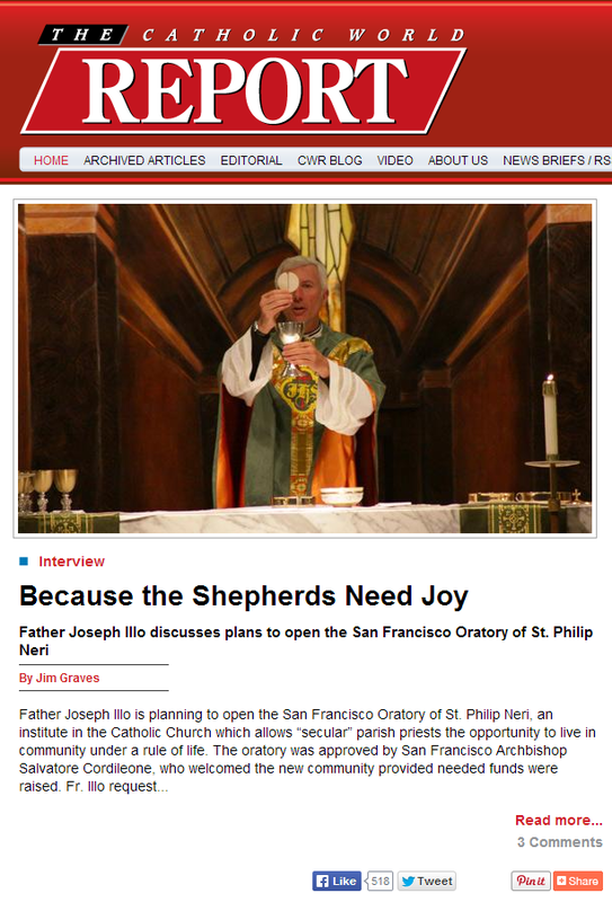
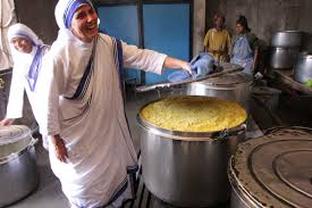 An MC sister cooking a meal for one of her priests. An MC sister cooking a meal for one of her priests. I am in Rio de Janeiro, “on retreat” with the dear Missionaries of Charity sisters. I especially love the silence before breakfast. I usually come into chapel for my holy hour at 6am. At 6:20 the sisters leave to do their morning washing. From every part of the compound I hear the quiet sounds of sweeping, scrubbing, dusting, and mopping. The birds alone chatter and sing as the sisters quietly clean chapel, house, and garden for the new day. Usually they let me stay in the chapel, deftly working around me, but this morning they banished me to a beautiful little side chapel. The sisters feed their priests with the same love with which they clean their chapels. Three times a day a sister serves the priest his meals in the “priest room,” which is also the confessional and sometimes his bedroom. Sr. Amanda from India is serving me this retreat, with assistance from Sr. Therese Anna from Brazil. “Thank you, Father,” she beams after placing steaming plates of stew or soup on the table. “But, I wish to thank you,” I smile. “Oh, you may certainly thank me, but my greatest happiness is to see the fathers eat,” Sr. Amanda reassures me. “You hardly ate any of the chicken this afternoon,” she scolds. “Have some another sandwich.” The MC’s are ascetical in many ways, but not so much when it comes to food. “Sisters,” Mother Teresa would tell them, “you must eat enough to keep up your strength.” Sometimes, perhaps, a sister might go a bit farther than Mother would have recommended. All of them certainly make sure their priests have plenty to eat. “Obrigado,” calls out Sister Amanda again, all smiles. She had placed a bowl of fried potatoes and another of steamed rice, two ham-and-cheese sandwiches, a pot of beef stew, a large salad, half a pound of sliced watermelon, a bag of potato chips, and various fruit drinks before me. I used to get a little irritated at how much the MC’s expected me to eat, but I have long ago surrendered. They are mothers, and after all, our religion is based on food. Jesus commanded us to “do this in remembrance of me,” and he was talking about supper. From Mass to Mass, we eat our way to heaven. True, what we eat and drink is the Body and Blood of the Lord, and St. Paul excoriates the Corinthians for turning the Eucharist into a food fest, but for Jews and Christians, eating is sacred. Every meal recalls that Last Meal of the Lord before the Redemption. Upon appearing after his Resurrection, what did Jesus do? He wasted no time in having another meal with his disciples—this time a breakfast of bread and fish by the lakeshore. “Obrigado” in Portuguese means the same thing as “eucharistein” in Greek: to render thanks. The Eucharist is how we render thanks, and we do it by feeding others and ourselves. My job as a priest can be reduced to one word: “feed,” as in “feed my sheep,” as Jesus instructed Peter. “Give them something to eat,” he had told the Apostles after the Sermon on the Mount. “If you love me, you will feed my people.” Why should I be surprised that Sr. Amanda takes any less delight in feeding her priests than her priests take in feeding her? I am saddened when folks do not come to Mass very often to eat the body and blood of Christ. Sr. Amanda is saddened by priests who don’t eat much of her food. God gives us food, and He gives us the Eucharist, so we can give it to others. Tonight Sr. Amanda placed impossibly large quantities of food before me. She probably did that because I finished every last crumb of last night’s meal. I did my best tonight, and I think she was happy. My plan, after this retreat and next week’s retreat in Kenya, is to climb Mt. Kilimanjaro. I wonder if, for an additional fee, they will take you up the mountain in a sedan chair? 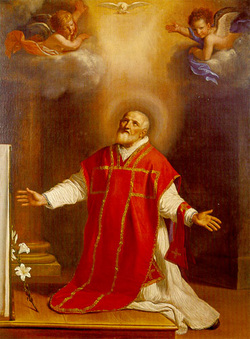 It is a Sunday morning in Washington, and I am waiting to fly to Rio de Janeiro to give a retreat to the Missionaries of Charity. My family had our best reunion in years yesterday, with heartfelt love expressed across four generations and many branches of the family tree. My brothers and I had many good bike rides in our hometown, in particular one lovely cruise as a golden-orange sun set behind Blue Mountain, the mother-guardian of my youth, against which all my childhood was framed and protected. We laughed and joked as we pedaled through the town that God gave us to grow up in, rejoicing to be together. As our family grows older, it grows also in love. Astrophysicists tell us the universe is continually expanding, galaxies and stellar systems relentlessly distancing themselves from each other. Unconsciously, we think that this is the way of friendship and family as well, that we all get busy, and become less connected as time and circumstances relentlessly pull us apart. But that is not what is happening to my family, although it has in the past. Now we are drawing closer, with deeper love and understanding as we grow older—as we approach the jumping-off point for the Eternal Banquet Feast of the Lamb (God willing). Tomorrow, May 26th, is the Feast Day of St. Philip Neri, who was born into eternal life 419 years ago. Happy Birthday, St. Philip! You might know that your scribe will be moving to Star of the Sea Parish in San Francisco August 1, hoping to establish an Oratory of St. Philip. We hope to form a community of priests and brothers who live as St. Philip did in his Roman parish of Santa Maria in Vallicella (St. Mary’s of the Little Valley) during the Renaissance. How did St. Philip live? Well, he was a mystic, an extraordinary saint given wondrous gifts. He was given, above all, an almost unbelievably burning love for Jesus, such that upon his death his heart was found to have grown to three times its normal size, breaking several ribs. During the Mass, his heart beat rapidly as he went into ecstasy, and he sometimes floated a few inches above the marble floor. It was enough, for someone suffering from a burden on his heart, for Father Philip to press that man’s head to his own heart, to relieve his sorrow and grant great joy. It is this supernatural joy that we hope to live among our small band of brothers in San Francisco. It is the joy of knowing Jesus, of knowing that God the Father sees us and loves us and provides for us. It is the joy of knowing the Holy Spirit of God within ourselves and each other. In today’s first reading, from Acts 8, another Philip (the Apostle), goes to Samaria to “proclaim the Christ to them.” With one accord, we read, the people paid attention, and “there was great joy in that city.” If only we, too, following Philip the Apostle and Philip Neri the “Apostle of Rome,” could become apostles of San Francisco! If only, through their intercession and by the grace of God, we too, secular priests that we are, could radiate that joy to an often sad and dysfunctional but beautiful city! San Francisco is not so different from the Rome of Philip’s time or the Samaria of Philip’s time. I believe everyone can radiate the joy of knowing that we are loved, and loved infinitely. It depends on prayer, really. If you are having difficulty in your marriage, pray, and you will find the joy again. If you have sickness in your body, or distress at work, or in your family, or find your state in life empty, pray to God, and you will recover that joy. It is for joy that God made us. I thank God for my family here in Pennsylvania (how much love and joy we had these past few days!), and I thank him for my future family in San Francisco. Happy St. Philip’s Day!  The "Freedom Tower" in lower Manhattan The "Freedom Tower" in lower Manhattan Thomas Aquinas College ended its academic year with Commencement exercises on Saturday, and I am now on a weeklong visit home to see my parents, siblings and cousins. On Sunday I will begin giving retreats to the Missionaries of Charity in Rio de Janeiro and Nairobi, and finally spend a week climbing Mount Kilimanjaro in mid-June. I don’t know what kind of internet access I will have during this period, so blog posts may be sporadic (especially on the way up Mt. Kili). Edwin Cardinal O’Brien led our Commencement this year. He was my seminary rector in the New York seminary 25 years ago and it sure was good to see him again. He flew all the way from Rome just to bless our graduates and send them on their way with some eminent words of counsel, just as he had given us prudent words in seminary in monthly rector’s conferences in the 1980s. I have not forgotten a bit of counsel he once gave me when I had missed a student social event. He came to my room and said “Joe, all the seminarians and faculty gathered for the banquet this evening and you were the only one not there.” He spoke directly but without disrespecting my freedom. I did not feel condemned or judged but I did feel regretful. “I’m sorry, Msgr. O’Brien,” was all I said. I knew he accepted my regret and trusted by good will for the future. In that brief interchange, my rector defined good leadership, although it’s taken some years to distinguish between attempting to control someone’s behavior and encouraging them to improve it. The key is to respect one’s freedom of responsibility. Today my family and I viewed Manhattan’s new “Freedom Tower” from a hill in North Jersey. It defines the skyline, as its predecessor Twin Towers had done before November 11, 2001. In one sense I’m proud that our country has been able to rebuild that which was destroyed. It testifies to human ingenuity and spiritedness. But somehow the name rings hollow. Yes, we have the money and manpower to rebuild the tower, even bigger and better than before. But are we more free in 2014 than we were in 1971, when the original towers were completed? Do we imagine that the world is free from the fear of terrorist attacks, or that the inequity between peoples that causes terrorism has been resolved? Do we enjoy freedom and respect from our own government, or from the National Security Agency? Does the government respect freedom of conscience more today than 40 years ago? Are children free to play in the streets? Has the “sexual revolution” freed women? My sense is that we are less free, and that we repeat the word “freedom” in speeches and brand names and buildings to convince ourselves that we are not afraid of the coming barbarism. We are, indeed, prisoners in gated “communities,” trapped in sexual and chemical addictions, and galley slaves to work schedules supporting unsustainable lifestyles. We are in fact less free to the extent that we progressively renounce the basis for all freedom, which is, in the words of our initial declaration of freedom, “the laws of nature and nature’s God.” The Declaration of Independence is clear that without a common acknowledgement of divine law, there can be no common agreement on human laws. Only the natural law, given us by nature’s God rather than devised by the Supreme Court, can free us from the inevitable abuse of power. Soviet Russia, for example, tried to retool human society based on human law without any reference to divine law, with predictable results. Last Sunday in the airport, I was talking to a young Jewish graduate in international law from Georgetown University. “I really appreciated the Jesuits,” he enthused, “because they gave us a faith-based perspective on law rather than just the human theories.” God bless the Jesuits at Georgetown, despite all their failings. If they can impart at least the concept of Natural Law into our future lawmakers, they will have done a great service. We may hope that all is not lost, even though mere knowledge of the Natural Law, without grace, is insufficient. But it’s a good start. The “Freedom Tower” is just a façade if it is not built on the foundation of God’s law. It will collapse, either from foreign terrorists who call our hypocrisy to task, or from American demagogues whose ignorance of the natural law will cause our legal and economic systems to fail. Here on earth there is no freedom without law, and no law without truth, the most fundamental of which is that God exists, and I am not He. “Unless the Lord build the house, in vain do the builders labor.” 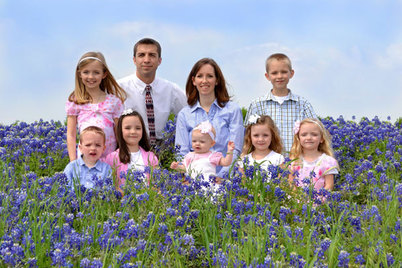 A nice large family A nice large family Our Lady’s Month This is the second Sunday in the lovely month of May, when life is blooming and brimming. A bunch of us prayed the rosary yesterday walking near the blossoming mustard flowers—they are five feet tall! TAC in the spring is the time to turn to Our Lady, the New Eve, truly the mother of all the living. Tuesday is the feast of Our Lady of Fatima; 33 years ago on Tuesday St. John Paul was shot in St. Peter’s Square. “One hand fired the gun and another hand guided the bullet,” he said. He went to Fatima a year later to lay that bullet in the crown of Our Lady’s statue, his mother in heaven who saved his life on earth. A mother’s voice A few years ago I was giving a retreat to the Missionaries of charity in Brazil and decided to disobey the superior. She had said not to go near the favela, the slum, at the bottom of a certain steep hill. But I so wanted to climb that hill and get a good look over the city, so I did it anyway. On the way down, a young man started yelling and then fired a pistol at me. The bullet didn’t hit me, and I ran. Back at the convent, I told Sr. Vera Maria. “Our Lady saved you,” she exclaimed. “Many people disappear into the favelas, but Our Lady saved you.” I felt abashed, and promised not to disobey her again. My mother’s voice was the first thing I ever heard. She would sing to me while I was in her womb, she told me. As a boy I would hear her singing in the kitchen below my room, and I would recognize that voice from some deep well within me. There were six kids in my family, and Mom would read to us every night (sometime Dad read too). We would drift off to sleep hearing our mother’s voice telling the story of some saint or a chapter from the Bible. Good Shepherd Sunday We call this Sunday, the Fourth after Easter, “Good Shepherd Sunday” because the Gospel is always taken from John 10. Today Jesus describes the voice of the good shepherd. “The sheep hear his voice,” he says. “They follow him, because they recognize his voice,” and he brings them “abundant life”—like the abundance of springtime mustard blossoms above our College. The Church speaks with the voice of Christ, which is the voice of a mother who loves her children. We all recognize it. Even those who say they hate the Church know that the voice with which she speaks is from God and is true. Pope Francis, in Evangelii Gaudium, describes how to give a homily on Sunday mornings: “The Church is a mother, and she preaches [as] a mother speaks to her child…. This setting, both maternal and ecclesial, in which the dialogue between the Lord and his people takes place, should be encouraged by the closeness of the preacher, the warmth of his tone of voice, the unpretentiousness of his manner of speaking, the joy of his gestures.” It is the way Christ spoke to the rich young man in Matthew 19: “Jesus looked at him with love and told him: if you wish to be perfect, give all your possessions to the poor and then follow me.” Jesus knew it would be hard for his young friend to hear what he had to say, so he first looked at him with great love. Holy Mother Church speaks as her Master speaks: not avoiding truths that must be said, but speaking them with understanding love, suffering for and with those to whom she speaks. World Day of Prayer for Vocations Fifty-one years ago, the Holy See designated Good shepherd Sunday as World Day of Prayer for Vocations. The voice of the shepherd calls young men and women through our Mother, the Church. Pope Pius X wrote that “every vocation to the priesthood comes from the heart of God, but it passes through the heart of a mother.” In my last parish, women would sometimes complain that we had too few priests. “Have more babies,” I would tell them. Priests don’t come from celibate men; they come from mothers. We won’t get many vocations from the 1.2 children the average American woman is giving to the Church. At age 19, young Jorge Bergoglio wanted to study medicine. His mother prepared a special room for him by cleaning out a cluttered room on the family’s terrace. One day, the future Pope’s mother entered the room to clean it. She found not medical books but theology books. “Jorge,” she said: “come here. You told me that you were going to study medicine.” “Si, Mamà,” he replied. “Why did you lie to me?” She said. “Mamà, I did not lie to you; I am going to study the medicine of the soul.” His mother wept when she realized that he would become a priest. She knew he would have to leave their village, and perhaps she even knew that he would have to go very far away, to Rome, someday. Do you read to your children at night? Do you pray the rosary with them? Nothing but a mother’s love will make their vocation real to them. Thank you, dear mothers, for having children. We know that it is the noblest human activity, and often the hardest, to bear and educate new lives. Thank you, dear mothers, for speaking the truth in love to your children, that they will grow up to know God, love him, and serve him in the Church in the vocation God has chosen for them. Where are future priests and nuns going to come from? Where is the priest who will be standing in my place twenty years from now? I will tell you where that priest is. He is having dinner with you this evening. You will a read saint’s story to him tonight, and pray a decade of the rosary with him and his brothers, and tuck him in tonight. God wishes them to be saints, by hearing the voice of the Good Shepherd through you. We love you for giving us life, and for giving us the Author of Life through his own mother, Our Lord Jesus Christ. 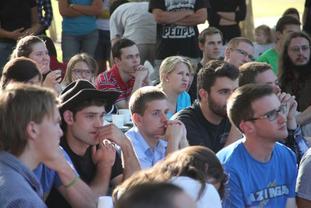 TAC students listen as Fr. Illo bids a fond farewell TAC students listen as Fr. Illo bids a fond farewell Note: Fr. Illo offered these thoughts at a farewell barbecue given for him by the students and staff of Thomas Aquinas College on May 4, 2014. Thank you for coming to say good-bye to someone who was with you only briefly. It’s a good reason to have a barbecue—many thanks to the cooks! Briefly indeed—I hardly got to know you, but what I did get to know has been with a Tolkienesque affection and reverence. I feel like Bilbo at his eleventy-first birthday speech, but I won’t repeat his cryptically ambivalent modalism on that occasion (something about not knowing half of you half as much as I’d want). It’s been brief—I had intended to be at TAC for 3 years, but Archbishop Cordileone asked if we could get moving on the San Francisco Oratory this year. “Are you bound by contract with TAC?” he asked me last year. “Just bound by fraternal charity,” I told him, “and there’s lots of that here in Santa Paula.” In fact, I discovered “love” right away at TAC. I had interviewed with several other Catholic colleges, all of whom offered me chaplaincy positions, but only TAC offered me a job with these words: “We love you father, and we hope you will take this position.” So devastatingly disarming—you might guess that our esteemed Dean uttered those words, so characteristic of our beloved Dr. Kelley. My Dad was a college professor, and I’ve always wanted to be a college professor. I was on my way to becoming one when I sensed a call to the priesthood, so I switched from literature to theology. But these two years have been a kind of dreamy sabbatical between parish assignments, at least living with college professors and strolling through breezy quadrangles between classes. TAC is all about truth, but even more obviously for brief sojourners like me, the College manifests beauty. The afternoon sun on Santa Paula Ridge, for example; the morning sun that first touches the Topa Topa bluffs; young voices ringing out the glory of God in a perfectly-proportioned chapel; students sprawled under spreading oak trees with Plato and Aquinas, or playing soccer on broad green swards; spirited Shakespeare plays and Gilbert and Sullivan operettas somehow rehearsed to near-perfection alongside ambitious academic loads. I hope the San Francisco Oratory will be counted among TAC’s many friends and supporters for years to come. I hope we can send students to you, and you can send an occasional “discerning young man” to us (if he can escape the titanic forces emanating from TAC’s lovely females). Much good work has already been accomplished at the future Oratory parish in San Francisco: a healthy elementary school and the Latin Mass every day. It is close to a few universities and Archbishop Cordileone has indicated we put particular energy into youth and young adults, as is consistent with the charism of St. Philip Neri. I thank you for affording me a brief stay with you; I ask your prayers for our fledgling Oratory of priests in SF, and assure you of ours.  The world still needs good shepherds! The world still needs good shepherds! The Month of May This is the first Sunday in the lovely month of May. I don’t remember Santa Paula Ridge so brimming over with yellow mustard last year! It is a beautiful springtime here at TAC, and every May we turn to Our Lady, Mother of Life. Tonight, after my “farewell barbecue” by the sports fields, we will have a rosary procession to the Lourdes Grotto. My best parting gift would be for you to pray the rosary of the Blessed Virgin Mary with me tonight. Thanks to our dear Legion of Mary for organizing this, as always. Good Shepherd Sunday We call this “Good Shepherd Sunday,” because of its Gospel: Ego sum pastor bonus. For about sixty years now the Catholic Church has designated Good Shepherd Sunday as also “World Day of Prayer for Vocations.” A vocation to the priesthood is God’s call to be a shepherd, to offer one’s life for the sheep. The day I was ordained to the deaconate, a friend asked her daughter Hanna what happened that day. “This big man with a pointed hat made Uncle Joe a shepherd,” she said. The little girl instinctively knew that Holy Orders transformed a man into a “good shepherd” who lays down his life for others. Christ suffered for you, Peter declares in the Epistle. Why did God have to suffer? First, because we had all gone astray like sheep, and someone needed to come to earth and rescue us, to pay the price, so to speak. “By his wounds have we been healed,” St. Peter continues. But more fundamentally, Jesus Christ suffered for us because he loved us, not as a mercanarius, a “hired man,” but as a shepherd. He proved his love for his Father by obeying him, and so proved his love for us by suffering in our place. There is no authentic love without suffering. The Vocations Crisis is a Crisis of Faith And so Jesus says, “I am the good shepherd.” He is good because he knows the Father and the Father knows him. Only in knowing the Father can the good shepherd know his sheep. Only in knowing the Father can a priest know his people, and knowing, love them, and loving them, serve them. The crisis of the priesthood, which began with Judas and will continue until the Second Coming—the crisis of unfaithful, scandalous priests, shepherds who eat their sheep, is fundamentally a crisis of faith. The crisis of vocations—the fact that the world has too few priests to meet the needs of the Church—is a crisis of faith, and nothing less. It is a crisis of priests who do not pray, and therefore know neither God nor their people. Not a few priests have been trained to be “activists” in seminaries—in bad seminaries—to consider prayer as something optional for those who like that kind of thing, but not essential to the priesthood. This is not true. A priest is essentially a man of prayer, as Jesus was essentially a man of prayer. When I was in seminary a priest told me that “nothing can touch a man of prayer.” No real harm can come to a priest who is faithful to his prayer life, even when he doesn’t want to pray, or especially when he doesn’t want to pray. John Paul II defined the “parish” as a “school of prayer” in his blueprint for the Third Millennium. But how can a priest teach others to pray if he does not know how himself? It is hard to pray if you don’t know how. We must make time for prayer, and continually work on our prayer life. Expect your Priests to Pray And so the key, it seems to me, of this Good Shepherd Sunday, the World Day of Prayer for Vocations, is priestly prayer. Expect your priests to pray, to pray the Mass from the heart, to pray their breviaries faithfully, to make a daily holy hour, to go to confession every few weeks, to keep up their spiritual reading, to pray the rosary every day. In 23 years of the priesthood, no bishop or layperson has ever asked me if I’m faithful to my prayer life, to the breviary, the Mass, confession, to Our Lady. A few good priest friends have asked me, but no one to whom I’m actually accountable—neither to my superiors (bishops) nor the people I serve (laity). Pray for your priests, yes, pray for vocations, but also expect and encourage your priests to pray as good shepherds, as Jesus, who knew the Father and the Father knew him through a consistent and intense interior life. 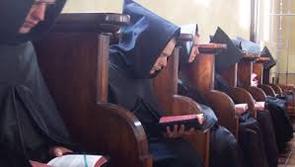 I’m sorry that I haven’t posted a homily in two weeks (thanks to those who have reminded me—it’s nice to be missed!). You may be interested in how homilies become blog posts: the homily gets written by Saturday, preached two or three times on Sunday, and edited for posting Sunday night (unless there are lots of student volleyball games). “Editing” means straining out the written parts that in fact proved less compelling in the actual preaching. These Eastertide readings, though, are compelling enough even without the preaching. Take this, for example from last Sunday’s Mass: “The community of believers was of one heart and mind… devoting themselves to the teaching of the apostles and to the communal life, to the breaking of bread and to the prayers.” This glimpse of the Early Church, the great Springtime of humanity after the Resurrection, fills every Christian’s heart with longing for what once was. It particularly fills a parish priest’s heart, because we know how empty “rectory living” can be. One of the great scandals in the Church today, of which many other scandals derive, is the coldness and emptiness of your parish priest’s personal life. The average diocesan priest doesn’t live even a minimally community life: he doesn’t share his faith or even minimally fraternal towards the men with whom he lives. He either lives alone or he lives as a loner with other loners in big rectories. Most live as comfortable but loveless bachelors. I’ve lived in some pretty lonely rectories in my time, rectories that almost completely incapacitate priests from the joy that is rightfully theirs, rectories that extinguish the zeal the Church needs from her priests. It is not good for anyone that so many priests live isolated from real human community. Sunday’s first reading concludes: “Awe came upon everyone … They ate their meals with exultation and sincerity of heart, praising God and enjoying favor with all the people.” Every priest, unless he is completely jaded, wants to enjoy this kind of fraternal charity, so essential to the very identity of priests! The Oratory is one way to renew the essential fraternal dimension of the priesthood. People are asking me: what is the “Oratory?” What do you hope to gain by establishing it in San Francisco? The essence of the Oratory, I would say, is Fraternal Charity. It’s the kind of community we see in those early chapters of Acts. In August, Fr. Patrick Driscoll (a dear friend from the Archdiocese of St. Louis) and I will become the parish priests of St. Mary, Star of the Sea in San Francisco. We will pastor a parish, of course, and support its school, and work on other pastoral initiatives as the Archbishop directs us. But none of our work will be effective if we don’t first “devote ourselves to the teaching of the apostles and to the communal life, to the breaking of bread and to the prayers” (Acts 2). On the most human level, we first need to “eat our meals with exultation and sincerity of heart, praising God ….” The Oratory will provide secular priests with a community in which to live fraternal charity, in order that they might render authentic priestly service. Charity begins at home, but most priests don’t have a home. Every day here at TAC three of us priests, with some students and teachers, pray the morning office together. I can’t describe the joy and energy with which these prayers fill me. Never do I love my brothers more than when I am praying with them from the heart. This is what we hope for in the Oratory: a common life of prayer, familiar discourse on the Word of God, and the continual exercise of fraternal charity. Oratorians do not take vows, as do religious order priests. St. Philip wanted his sons to live together with no other bond than the gentle but mighty bond of charity. He hoped that their lives and preaching would imitate that of the first Christians. It will be a tricky business, bound by nothing beyond the gentle bonds of fraternal charity. We will have to depend entirely on God’s grace and forget ourselves. We ask your prayers. |
Fr. Joseph IlloStar of the Sea Parish, Subscribe to
|


 RSS Feed
RSS Feed